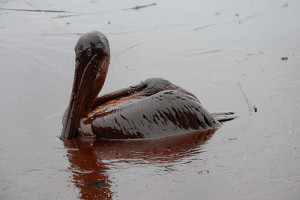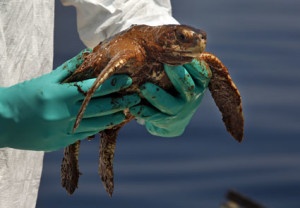We have much more to do and your continued support is needed now more than ever.
BP’s Gulf Oil Spill Trial 101: A Primer
This week was the start of the Deepwater Horizon disaster trial. Remember the start of the disaster itself? Initially, BP was downplaying, denying, and hiding the awful truth: that crude oil, natural gas, and methane hydrates were gushing into one of the most productive ecosystems in the world. For 87 days, I watched as the oil flowed unabated, afraid of what this meant for my home state of Florida and thinking, “our response to this will be a defining moment for my generation.”

One way or another—either through a ruling or a settlement—BP will be held liable for violations of federal environmental laws designed to protect the public from pollution.
So far, the evidence has confirmed some things we already knew from the multiple investigations into the disaster. BP’s corporate mantra that “every dollar counts” put profits over safety in the Gulf of Mexico.
The restoration needs of the Gulf are real, they are imminent, and they must be addressed now. But any final judgment or settlement that fails to adequately compensate for the losses and deter future recklessness would be an injustice for the Gulf and for the nation.
For those who are watching to make sure BP is held accountable, here’s a summary of the basic trial process over the coming months:
Phase One
The main point that Judge Barbier is considering in this portion of the trial is whether there was “gross negligence” on the part of the BP and the other defendants. It matters because the law punishes gross negligence more strongly than simple accidents. Under the Clean Water Act, a finding of ordinary negligence would result in a fine of $1,100 per barrel, while gross negligence or willful misconduct could result in a fine of $4,300 per barrel.

The proceedings will focus on:
- Loss of well control — What actions prior to the accident led to the release of gas from the well?
- Fire and explosion — How did the gas reach the deck of the Deepwater Horizon and ignite?
- Sinking of the Deepwater Horizon — Why did the rig sink after the explosion and fire?
Judge Barbier will consider the evidence about what led to each of these occurrences to determine how unreasonable the actions of BP and its codefendants were before, during, and after the explosion. NWF’s legal experts believe that these factors will show that BP was grossly negligent.
Phase Two
The second phase will focus on two key issues from the time the oil rig sank to when the spewing well was permanently sealed.
- Source Control — What BP, Transocean, and other parties did to stop the release of oil and gas, including allegations that BP and Transocean were not prepared to deal with the blowout and uncontrolled oil release.
- Quantification of Discharge – Both sides will present testimony on how much oil was released into the Gulf from the time the spill began until the well was capped.
Speak Up For the Gulf!
The Gulf ecosystem and its wildlife need restoration now. We hope to see justice for the Gulf in the form of maximum penalties under the Clean Water Act and the Oil Pollution Act that will then used for crucial ecosystem restoration.
![]() Help protect the Gulf’s wildlife! Ensure that the Department of Justice holds BP fully accountable for restoring Gulf habitat for dolphins and other species >>
Help protect the Gulf’s wildlife! Ensure that the Department of Justice holds BP fully accountable for restoring Gulf habitat for dolphins and other species >>
You can follow all the BP trial proceedings on the Mississippi River Delta Coalition’s Twitter and Facebook.





















